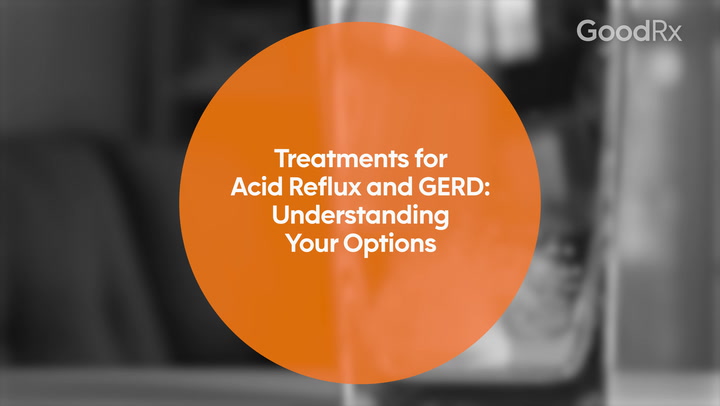
Home Remedies for Acid Reflux: What Works, and What Doesn’t?
Key takeaways:
Acid reflux is a common digestive health issue that different foods and medications can trigger.
Many people try home remedies for acid reflux — such as apple cider vinegar, ginger, and milk. But they have little scientific evidence to support their effectiveness.
There are proven ways to reduce acid reflux. These include diet changes, weight loss, and medications that reduce acid production.

That burning sensation in your chest after a meal? That just might be acid reflux.
If you’ve had it, you know how uncomfortable it can be. Many people turn to at-home treatments — like apple cider vinegar or ginger — in the hopes of a quick fix. But do home remedies for acid reflux work?
Here, we’ll review what the science says about natural remedies. And we’ll share some of the lifestyle and medication options that may help more.
Search and compare options
What is acid reflux?
Acid reflux is when contents from the stomach go up into the esophagus (the tube that connects your mouth to your stomach). This often causes a burning sensation in the chest, which many people describe as heartburn.
The more technical name for acid reflux is gastroesophageal reflux disease (GERD). It happens when the lower esophageal sphincter, a tight ring that separates the stomach and esophagus, is not working properly. GERD occurs in 10% to 20% of adults. And it can affect infants beginning at birth.
What are some home remedies for acid reflux, and do they work?
People frequently try acid reflux treatments at home to ease symptoms of heartburn, from milk to apple cider vinegar. Below, we’ll go over what the scientific evidence says about which natural remedies work best for reflux.
Does apple cider vinegar help with acid reflux?
Apple cider vinegar is a popular home remedy for reflux. This may seem odd, since acidic foods are thought to cause reflux and vinegar is an acid.
The benefits of apple cider vinegar for reflux come from anecdotal accounts. People swear by it, even if there’s no proof that it works. Scientific evidence to back these claims is almost nonexistent. What’s more, it’s important to note that vinegar can cause caustic injury to the esophagus at high concentrations. If you do try it, make sure to dilute it with water.
Is ginger good for acid reflux?
Ginger is well known for treating nausea and vomiting. But there are fewer scientific studies to show any beneficial effects on heartburn. Some small studies show that ginger shows promise for managing heartburn. However, this requires more research to know for sure.
Diet and heartburn: We break down the best — and worst — foods and drinks for reflux.
Can probiotics help with reflux? Certain types of probiotics may help with heartburn symptoms. Learn which ones may be most effective.
Over-the-counter (OTC) options for heartburn: Learn about common OTC medications — like antacids and proton pump inhibitors — that can help treat reflux symptoms.
Interestingly, the National Library of Medicine says that a common side effect of ginger is heartburn. And studies on ginger often report heartburn as a side effect, so you may not find it helpful for reflux. You can try ginger tea, but stop using it if it worsens your acid reflux.
Does drinking milk help acid reflux?
Some antacids contain calcium. So, many people think that milk, which also contains calcium, may be a good home remedy for acid reflux. Is this the case?
Fat is a known trigger for heartburn. So full-fat (homogenized) or 2% milk may not be helpful, since the fat may aggravate reflux. But a clinical research study that looked specifically at the effects of low-fat and high-fat milk found no benefit — or harm — to either type of milk.
What causes acid reflux?
Acid reflux can be triggered by many different things. Common triggers include certain foods and drinks and medications, as well as smoking.
Foods and drinks
Foods and beverages that commonly cause acid reflux tend to be high in fat, acid, salt, or spice. People may get acid reflux from many different foods. But some of the most common culprits include:
Deep-fried food
Potato chips and salty snacks
Tomatoes and tomato sauce
Spices such as chili powder, cayenne pepper, and black pepper
Fatty meats, such as sausages and bacon
Full-fat cheeses
Acidic fruits, such as oranges and grapefruit
And some of the most common drinks to cause acid reflux are:
Carbonated beverages such as soda
Caffeinated beverages
Alcohol
Medications
Certain medicines may also cause acid reflux, including:
Nonsteroidal anti-inflammatory drugs (NSAIDs)
Benzodiazepines (“benzos”)
What are some lifestyle changes that may help with acid reflux?
Natural remedies for GERD include lifestyle changes that may help improve symptoms of heartburn. Here are some things you can do:
Quit smoking.
Evaluate your eating habits and avoid foods that cause heartburn.
Eat smaller meals.
Avoid eating before bedtime or lying down.
Elevate your head while sleeping by using a wedge or extra pillows.
Avoid tight clothing.
Do low-impact exercise.
Medications for reflux
It’s important to talk to a healthcare professional if you’re experiencing frequent episodes of heartburn. They may want to run some tests to make sure your symptoms are coming from reflux. They may also recommend medications to ease acid reflux, such as:
Antacids
H2 blockers
Proton pump inhibitors
In some cases, healthcare professionals may recommend surgery if your symptoms don’t improve with lifestyle changes and medications.
What can stop acid reflux immediately?
When it comes to finding a solution for acid reflux, it’s natural to want an immediate fix. You can try an antacid such as Mylanta, Rolaids, and Tums for quick heartburn relief. These provide a temporary fix. But you should check with your healthcare team if your acid reflux occurs frequently.
Overuse of antacids can cause side effects, such as diarrhea or constipation.
Frequently asked questions
Acid reflux can get worse at night because you’re more likely to be lying down to go to sleep. When you lie down, gravity can’t help move food from your esophagus to your stomach. So food and acid pools in your esophagus, causing heartburn.
If you get acid reflux late at night or overnight, try avoiding meals 2 to 3 hours before bedtime and elevating the head of your bed with pillows or a wedge.
Yes, drinking water may help with acid reflux. One study found that drinking a glass of water made the stomach less acidic within a minute. And swapping out your coffee, tea, or soda with water can help improve reflux symptoms.
Some research suggests that drinking alkaline water might be especially helpful for heartburn, but more research is needed to know for sure.
Yogurt may be good for acid reflux because it contains probiotics. Certain probiotics — like Lactobacillus acidophilus and Bifidobacterium — have been found to help reflux and heartburn symptoms. But not all yogurt contains probiotics. And yogurt itself hasn’t been studied much for its effect on acid reflux. So, if you want to try yogurt to help your heartburn, make sure it has probiotics — and pay attention to how you feel after eating yogurt.
The bottom line
When it comes to acid reflux, it’s natural to want a simple home remedy. Some people swear by apple cider vinegar, ginger, or milk. But there’s no good scientific evidence to show that these home remedies help for reflux. You may find it more helpful to focus on identifying the foods that trigger your acid reflux. And try eating smaller meals, avoiding food prior to bedtime, and engage in low-impact exercise.
Whether or not these changes work, it is important to talk to your primary care provider about your symptoms. They can check for other causes of your symptoms and recommend helpful treatments to keep you healthy.
Why trust our experts?


References
Ahuja, A., et al. (2019). Popular remedies for esophageal symptoms: A critical appraisal. Current Gastroenterology Reports.
Anh, N. H., et al. (2020). Ginger on human health: A comprehensive systematic review of 109 randomized controlled trials. Nutrients.
Fernando, I., et al. (2022). The impact of low-fat and full-fat dairy foods on symptoms of gastroesophageal reflux disease: an exploratory analysis based on a randomized controlled trial. European Journal of Nutrition.
Herdiana, Y. (2023). Functional food in relation to gastroesophageal reflux disease (GERD). Nutrients.
Karamanolis, G., et al. (2008). A glass of water immediately increases gastric pH in healthy subjects. Digestive Disease and Sciences.
Katz, P. O., et al. (2013). Guidelines for the diagnosis and management of gastroesophageal reflux disease. The American Journal of Gastroenterology.
Lynch, K. L. (2024). Gastroesophageal reflux disease (GERD). Merck Manual.
Mehta, R. S., et al. (2020). Association between beverage intake and incidence of gastroesophageal reflux symptoms. Clinical Gastroenterology and Hepatology.
National Institute of Child Health and Human Development. (2024). Ginger. Drugs and Lactation Database.
National Institute of Diabetes and Digestive and Kidney Diseases. (2020). Symptoms & causes of GER & GERD. National Institute of Health.
National Institute of Diabetes and Digestive and Kidney Diseases. (2020). Treatment for GER & GERD. National Institute of Health.
Newberry, C., et al. (2019). The role of diet in the development and management of gastroesophageal reflux disease: Why we feel the burn. Journal of Thoracic Disease.
Schulz, R. M., et al. (2022). Effectiveness of nutritional ingredients on upper gastrointestinal conditions and symptoms: A narrative review. Nutrients.
USC Voice Center. (n.d.). Acid reflux.

























